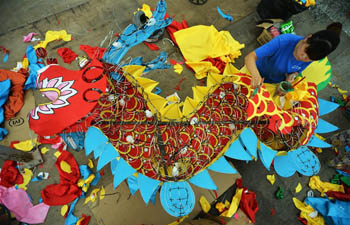YINCHUAN, Aug. 30 (Xinhua) -- Ten years ago, most farmers in Caichuan village in western China lived in caves carved out of the mountainside and had almost nothing of value in their homes.
Caichuan is located in Yuanzhou district, Guyuan city, in the Liupanshan mountain area of Ningxia Hui Autonomous Region. It is one of the poorest areas in China. People there have long been troubled by perennial drought, barren land and job scarcity.
But Caichuan no longer suffers from poverty, and it is being copied around the region after it found a powerful weapon to fight poverty -- microfinance.
It all started nine years ago with a test loan program by the Ningxia branch of the Postal Savings Bank of China. The bank turned community ties in villages and grassroots Communist Party organizations into mortgageable items of modern finance.
Since 2008, the bank loaned 112 million yuan (16 million U.S. dollars) to farmers in Caichuan and there were no bad debt, said Yu Shulan, vice chief of the bank.
This micro-finance program, which started in Caichuan, has spread to 302 poverty-stricken villages, where farmers earn less than 2,300 yuan per person a year.
"The problem with poor people is that they have little to mortgage and get loans. Using community ties and party organizations as guarantees, we get people to start a business and rise out of poverty," Yu said.
MONEY TO RAISE CATTLE
Caichuan has 1,625 people in 358 families, most of whom are of Hui ethnicity. People here raised sheep for living until 2002, when herding on the neighboring mountains stopped in order to reduce damage to the ecology.
"We sold the sheep and went out to work as migrant workers, earning very little," said Ma Jinguo, who was then the director of the village committee, and one of the main campaigners for the loan program.
Starting from 2008, Caichuan was chosen as a pilot area for small loans by the bank.
"Each loan applicant was paired up with two other families, who were richer and had techniques to help the applicant. At first, only 13 families applied, and each one was given 10,000 yuan for a period of a year," Ma said.
"All of the loans were paid back after a year, and other villagers saw the success and were eager to join the program," Ma said.
As the number of loan applicants grew, a cattle-raising cooperative was established to supervise the credit situation of each applicant, which used a communal fund to offset risks of default. The cooperative supported farmers to raise cows, by helping with selection of cow breeds, husbandry techniques and sales.
"Ours is a small village, and almost everyone is another's friend, relative or share the same ancestors. The cooperative is familiar with each applicant's financial situations, and it helps the bank decide how much loan he/she may have," Ma said.
Almost every family at Caichuan is a member of the cooperative now and a single loan has reached 150,000 yuan, the bank said. A single loan is due every five years and interest rate can be lowered to 4.35 percent, which is lower than other business loans. Extremely poor households are exempt from paying interest on the loans.
Yang Zongren, 33, was one of the first group to receive the loans. He now owns 21 cattle, with each one worth up to 20,000 yuan.
"The cave houses my family once lived in are now storage houses," Yang said. "I have had very good returns from raising the cows, so paying loans is not a problem at all. Life has gotten quite easy for me."
EFFECTIVE RISK MANAGEMENT
Villager Hai Defu does not have a burglar-proof door at his home, but he has one for his cow shed.
"The nine cows are the biggest asset in my family. If I lose them, I will have nothing to pay the bank," Hai said.
At Caichuan, it has become a common understanding to live in good faith and pay debts, said Zhao Zhigang, head of the bank.
"Rural people live in smaller circles than urbanites, and ties with their community and relatives are the biggest treasure. Faith to their community connections has helped restrain the loan users," he said.
The bank has individual rating for families in Caichuan. The local government has pooled fund to support the loan program and control risks.
"There are three levels of ratings, A, B and C, for poverty-stricken households, whose details are kept in government records," he said.
Eighty percent of the farmers at Caichuan have A ratings, and there has never been a bad loan for ten years, said Yu Shulan. Per capita annual income was 7,735 yuan in 2016, a giant leap from a mere 2,000 yuan nine years ago.
In Ningxia, the postal savings bank has given out 2.1 billion yuan of such loans. Twenty-seven villages, including Caichuan, have been awarded the titlle "credibility villages."
"Even the poorest village can have a golden mine of credibility. The loan program empowered poor farmers who are willing to work hard, and helped establish a profitable industry chain. We hope our experience can be of value to other poor areas that are actively fighting poverty," Zhao said.

















